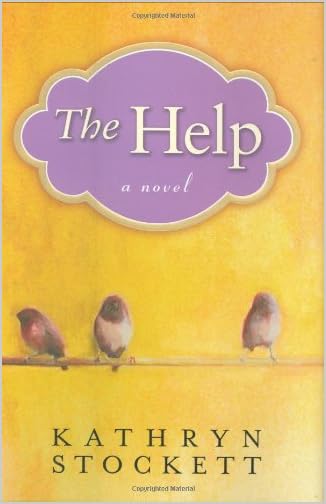The Help

KarenMEG recommended The Help over on her blog, so I thought I’d put it on hold at the library. I did, but then I found out I was number 258 in line for it, and decided that maybe I’d buy it myself. So the next time we were at the bookstore, I looked for it, but I couldn’t find it in the fiction area. I asked the helpful person behind the information desk, and he said they should have it, they had 5 copies an hour earlier, but it was downstairs on the ‘Best Sellers’ shelf. Down we went, where he scooped up the very last copy and handed it to me. Whew.
I’ll admit, I’m a bit of a snob when it comes to best sellers. I look at the list in our Sunday paper, of national bestsellers, and I feel snotty thoughts about how I prefer literature to drivel, and most people are clearly stupid. Seeing this in writing, and looking at the books in my book reviews tab, I realize that not only am I a snob, I’m a misguided snob, because quite a bit of what I read is NOT high literature. So I need to get over myself quite quickly.
The Help is Kathryn Stockett’s debut novel, a story based partially upon her upbringing in Mississippi. They had an elderly black maid, Demetrie, whom Stockett loved dearly as a child. But though she loved Demetrie, she never really considered what Demetrie’s life was like, and she felt at some points that she was lucky to have them to cook and clean for. So when Stockett grew up and went to New York, she decided that she wanted to explore that theme a bit, explore the everyday life of black maids in the deep south at a pivotal time in history, 1963 and 1964. That she is a white woman trying to get into the heads and voices of black women of the time was a bit jarring at first, but it didn’t take me long to get past that.
The story is told through the eyes of three characters. There is Aibileen, a maid mourning the death of her 24-year-old son, who has raised 17 white children. She loves taking care of babies, but only until the point when they start to understand and agree with their station in life, that they are superior to her by virtue of the color of their skin. She knows how to quietly take it from the boss, but isn’t ready to take it from the boss’s children. So at that point, she moves on to another house.
There is Minnie, an angry maid with young children and an abusive husband at home, who is fired from job after job because she speaks her mind to her employers, which they consider to be mouthing off. She unfailingly finds new work, because she is an amazing cook. Until now, when her most recent employer decides to accuse her of stealing some of the silver. Now she’s having more trouble finding work, and has to resort to working for someone out of town, out of the inner circle of Junior League ladies. Someone who desperately wants into that world.
And there is Skeeter, a 23-year-old recent graduate of Ole’ Miss, who has come home a failure at finding a husband (her mother’s dream, not hers), and is trying to find her way as an author. The advice she receives is twofold and differing. First, get a job writing for a local paper, no matter what it is, and write. That gets her writing every day, and starts her building a name for herself. Secondly, write for herself, about something important, something that bothers her. So she decides she will write about the way that white employers treat their domestic help, spurred on by a local battle over putting in separate toilets for the maids to use, so that the employers don’t have to use the same bathroom as the help.
Talking to Skeeter is a dangerous proposition. Medgar Evers has just been murdered for speaking out against racial injustice, and the adult son of one of the maids is blinded by the brutal beating he receives for using a ‘white only’ bathroom. Skeeter understands the danger at some level, but not deep down. Aibileen and Minnie deeply understand the risk they would take in telling their story, but keeping their stories hidden inside is killing them.
The stories themselves are varied. There is hatred for the cruelty and indignities that the maids are forced to endure, but there is also genuine love and affection for some of the white families, and certainly for the children they are raising. It is a bizarre world where there is much love and affection on both sides, and yet the power structure is so heavily weighted to one side, there is never any real possibility of understanding between them.
I would say that Kathryn Stockett has done a wonderful job, though a few characters were more caricature than real, and I was completely sucked in. I was glad to have a few hours to myself on Friday evening to gobble the book up. I recommend it.
One Comment
Starshine
great review, jules! i’ve read so much about this book–i think i need to go and pick up a copy.
miss you!